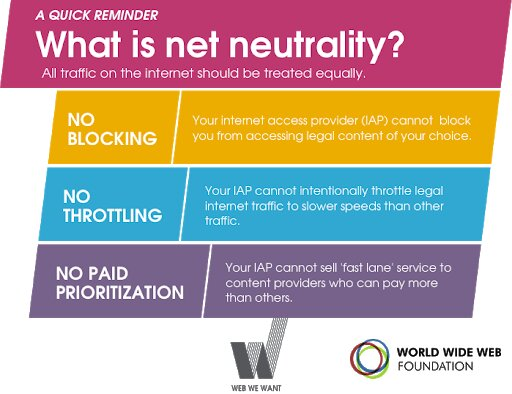Indian Economy
Net Neutrality
- 20 Mar 2023
- 6 min read
For Prelims: Cellular Operators Association of India (COAI), Telecom Regulatory Authority of India (TRAI), Internet Service Providers.
For Mains: Net Neutrality.
Why in News?
The Cellular Operators Association of India (COAI), which represents Bharti Airtel, Vodafone Idea, and Reliance Jio, the three major telecom operators in India, has been demanding that platforms such as YouTube and WhatsApp pay a share of revenue to make up for the network costs.
- This has reignited the debate around net neutrality.
What are the Arguments and Recent Developments on the Issue?
- Telecom operators are demanding payment for enormous usage on their networks.
- Telecom operators in the European Union are also demanding similar usage fees from content providers.
- Content providers argue that imposing such a fee, even on a limited number of large players, was a distortion of the internet’s architecture.
- In 2016, the Telecom Regulatory Authority of India (TRAI) ruled in favour of net neutrality.
- In 2018, the Department of Telecommunications embedded the net neutrality concept into the Unified Licence, whose conditions all telecom operators and internet providers are bound by.
What is Net Neutrality?
- Net neutrality is the principle that all internet traffic should be treated equally, without discrimination or preference given to any particular website, service, or application.
- Net neutrality ensures that everyone has equal access to information and services on the internet, regardless of their financial resources or the size and power of the websites they use.
- It is an important principle that helps to ensure a level playing field on the internet, and to protect the free flow of information and ideas.
- Without net neutrality, Internet Service Providers could potentially use their market power to steer users towards certain websites and services, or to limit access to others.
Who are the Different Stakeholders in the Internet Space?
- The stakeholders in the internet space are:
- The consumers of any internet service
- The Telecom Service Providers (TSPs) or Internet Service Providers (ISPs),
- The Over-the-top (OTT) service providers (those who provide internet access services such as websites and applications),
- The government, who may regulate and define relationships between these players.
- Also, TRAI is an independent regulator in the telecom sector, which mainly regulates TSPs and their licensing conditions, etc.
How is Net Neutrality Regulated?
- Until now, net neutrality has not directly been regulated in India by any law or policy framework.
- Over the last year, there have been some developments with respect to the formulation of a net neutrality policy.
- TRAI is working on Differential Pricing for Data Services as well as Regulatory Framework for Over-The-Top Services (OTT).
- A Committee set up by the Department of Telecommunications (DoT) has also examined the issue of net neutrality.
- Also, Internationally, countries like the USA, Japan, Brazil, Chile, Norway, etc. have some form of law, order or regulatory framework in place that affects net neutrality.
What Will Happen if There is No Net Neutrality?
- Monopolizing Internet:
- Without net neutrality, ISPs would have the ability to shape internet traffic to derive extra benefits from it.
- This would give them the power to charge companies like YouTube and Netflix for services that consume more bandwidth compared to a normal website.
- Without net neutrality, ISPs would have the ability to shape internet traffic to derive extra benefits from it.
- Discourage Innovation:
- Lack of net neutrality could spell doom for innovation on the web. Startups would be at a disadvantage compared to established players who have the resources to pay for faster access.
- This could lead to a web that is dominated by a few large players, rather than an open and diverse ecosystem.
- Package Plans for Consumers:
- The lack of net neutrality would also mean that instead of free access, there could be "package plans" for consumers.
- For example, users may have to pay more to access international websites compared to websites based in their own country. This would create a tiered internet system where users who pay more get better access to content.
- The lack of net neutrality would also mean that instead of free access, there could be "package plans" for consumers.
UPSC Civil Services Examination, Previous Year Question (PYQ)
Q. Which of the following is/are the aims/aims of the “Digital India” Plan of the Government of India? (2018)
- Formation of India’s own Internet companies like China did.
- Establish a policy framework to encourage overseas multinational corporations that collect Big Data to build their large data centres within our national geographical boundaries.
- Connect many of our villages to the Internet and bring Wi-Fi to many of our schools, public places and major tourist centres.
Select the correct answer using the code given below:
(a) 1 and 2 only
(b) 3 only
(c) 2 and 3 only
(d) 1, 2 and 3
Ans: (b)





